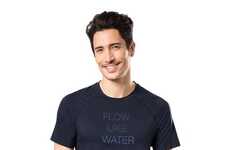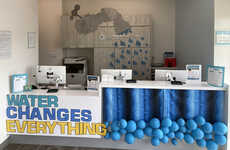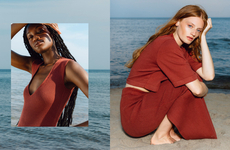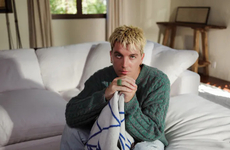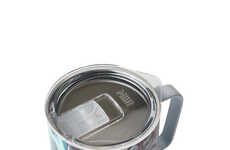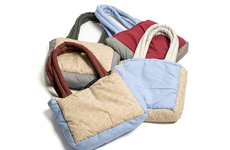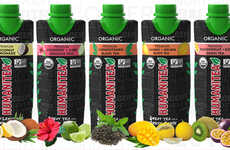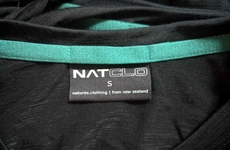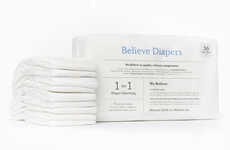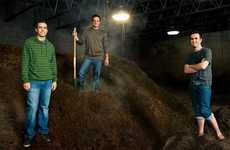
100% of Profits go to charity:water
Bianca — February 2, 2012 — Social Good
References: 100apparel.org
Regardless how old you are, it takes courage to become a social entrepreneur. In the interview below, Alex Mark, the founder of One Hundred apparel shares his story about creating a sustainable social business focused on authenticity and impact.
Alex's company, One Hundred apparel, gives 100% of its profits to charity:water, a nonprofit dedicated to providing clean, safe driving water to regions where it's not available. Read on for his story into entrepreneurship, which begins in his early college years.
6 Questions with Alex Mark, founder of One Hundred apparel
1. How did the idea for the business model come about?
During college, I was surrounded by people who were involved in student organizations/philanthropy. There was definitely a pervasive "philanthropic" focus on campus, which was a positive and encouraging thing. However, the feeling that people were participating more because they wanted a resume bullet point, and not because they actually wanted to help people constantly bothered me. I decided I was going to do something that actually made a difference, for the right reasons, and I started thinking of ways to do that. That's when I remembered an idea I had put on the back burner for a while: starting a clothing company.
I knew the success that social companies such as TOMS were having at the time, and I thought, why not take it to the next level? Instead of donating a portion of the profits in the form of a "One for One" or something like Project Red, why not make it the entire mission of the company to give ALL of its profits? Thus, One Hundred was born, to give 100% of our profits to help people get clean water.
2. How did you decide to join this sector?
I started graphic design when I was in high school, branching out from graphic/abstract art into design and illustration. I saw the success of independent designers starting clothing brands and I loved the way it combined two of my main passions, design and business, into one awesome concept. At the time, I was too young, and I had no idea what it took, but 5 years later, the timing was perfect and I knew I had the design and business ability to make this happen.
3. Why Social Business compared to non-profit?
I believe that social business has the power to enact change on a much bigger level than non-profits. Social businesses are scalable, meaning that the more money they make, the more money they donate. Most non-profits are always strapped for cash, and they have to choose between using that cash for growing their name (to get more donations) or using it to enact change directly. Choosing one reduces the other one. On the other hand, social business never has that problem; growth of the business leads directly to helping more people, it's that simple. There is no trade off.
4. How do you get your inspiration?
My main inspiration is One Hundred's mission and goal. One Hundred is all about water, and I think that is reflected in our clothing. I like to play a lot off of the design possibilities with water and symbolic nature for all of us. I also have other brands that inspire me with their simplistic and beautiful design, including favorites Ugmonk, CXXVI, and Stheart.
5. How do you reset yourself to be creative? Do you have any rituals?
Truth be told, designing is one of the things I spend the least amount of time doing. There are so many other things with the business that require my attention I usually only spend a couple of weeks designing per design cycle. Usually, during the time that I'm not designing, I'll get "struck with an idea" where I just have to sketch it out and put it down on paper. By the time it comes to design a new line, I have all my ideas right there in my sketchbook, and I just play around with the ones I like the best, making those into final designs!
6. Why clean water?
Clean water is one of the most effective ways to change a person's life. In developing countries right now, just $7 per person can build a well and literally change every aspect of that person's life. Instead of walking a long distance to collect water, that person can now go to school and do more productive things. Instead of family members dying, they will worry less about disease, and not have to go through the sorrow of losing a loved one, and save money. Clean water also means their children will live, hospitals will be more efficient, and the community will be more prosperous. It's really amazing how much of a difference clean water makes for so little!
Special discount for all Social Business readers: use code SB150 for 15% off your next purchase!
Alex's company, One Hundred apparel, gives 100% of its profits to charity:water, a nonprofit dedicated to providing clean, safe driving water to regions where it's not available. Read on for his story into entrepreneurship, which begins in his early college years.
6 Questions with Alex Mark, founder of One Hundred apparel
1. How did the idea for the business model come about?
During college, I was surrounded by people who were involved in student organizations/philanthropy. There was definitely a pervasive "philanthropic" focus on campus, which was a positive and encouraging thing. However, the feeling that people were participating more because they wanted a resume bullet point, and not because they actually wanted to help people constantly bothered me. I decided I was going to do something that actually made a difference, for the right reasons, and I started thinking of ways to do that. That's when I remembered an idea I had put on the back burner for a while: starting a clothing company.
I knew the success that social companies such as TOMS were having at the time, and I thought, why not take it to the next level? Instead of donating a portion of the profits in the form of a "One for One" or something like Project Red, why not make it the entire mission of the company to give ALL of its profits? Thus, One Hundred was born, to give 100% of our profits to help people get clean water.
2. How did you decide to join this sector?
I started graphic design when I was in high school, branching out from graphic/abstract art into design and illustration. I saw the success of independent designers starting clothing brands and I loved the way it combined two of my main passions, design and business, into one awesome concept. At the time, I was too young, and I had no idea what it took, but 5 years later, the timing was perfect and I knew I had the design and business ability to make this happen.
3. Why Social Business compared to non-profit?
I believe that social business has the power to enact change on a much bigger level than non-profits. Social businesses are scalable, meaning that the more money they make, the more money they donate. Most non-profits are always strapped for cash, and they have to choose between using that cash for growing their name (to get more donations) or using it to enact change directly. Choosing one reduces the other one. On the other hand, social business never has that problem; growth of the business leads directly to helping more people, it's that simple. There is no trade off.
4. How do you get your inspiration?
My main inspiration is One Hundred's mission and goal. One Hundred is all about water, and I think that is reflected in our clothing. I like to play a lot off of the design possibilities with water and symbolic nature for all of us. I also have other brands that inspire me with their simplistic and beautiful design, including favorites Ugmonk, CXXVI, and Stheart.
5. How do you reset yourself to be creative? Do you have any rituals?
Truth be told, designing is one of the things I spend the least amount of time doing. There are so many other things with the business that require my attention I usually only spend a couple of weeks designing per design cycle. Usually, during the time that I'm not designing, I'll get "struck with an idea" where I just have to sketch it out and put it down on paper. By the time it comes to design a new line, I have all my ideas right there in my sketchbook, and I just play around with the ones I like the best, making those into final designs!
6. Why clean water?
Clean water is one of the most effective ways to change a person's life. In developing countries right now, just $7 per person can build a well and literally change every aspect of that person's life. Instead of walking a long distance to collect water, that person can now go to school and do more productive things. Instead of family members dying, they will worry less about disease, and not have to go through the sorrow of losing a loved one, and save money. Clean water also means their children will live, hospitals will be more efficient, and the community will be more prosperous. It's really amazing how much of a difference clean water makes for so little!
Special discount for all Social Business readers: use code SB150 for 15% off your next purchase!
Trend Themes
1. Social Business - Creating a sustainable social business focused on authenticity paves way for change and a newer approach to social entrepreneurship.
2. Scalable Social Businesses - The concept of social businesses being scalable creates an opportunity to enact change on a much larger level.
3. Clean Water - Investing in clean water could pave way for more community prosperity and change people's lives.
Industry Implications
1. Fashion Industry - Design and fashion can be used to promote social messages and change, where buyers can help provide resources for social businesses.
2. Non-profit Sector - Non-profits should take inspiration from social business models to scale growth and enhance their scope of work providing different resources and services.
3. Water Filtration Industry - Investing in technology and innovation for water filtration could pave way for better health facilities, community health and well-being using cleaner water sources.
3.3
Score
Popularity
Activity
Freshness

